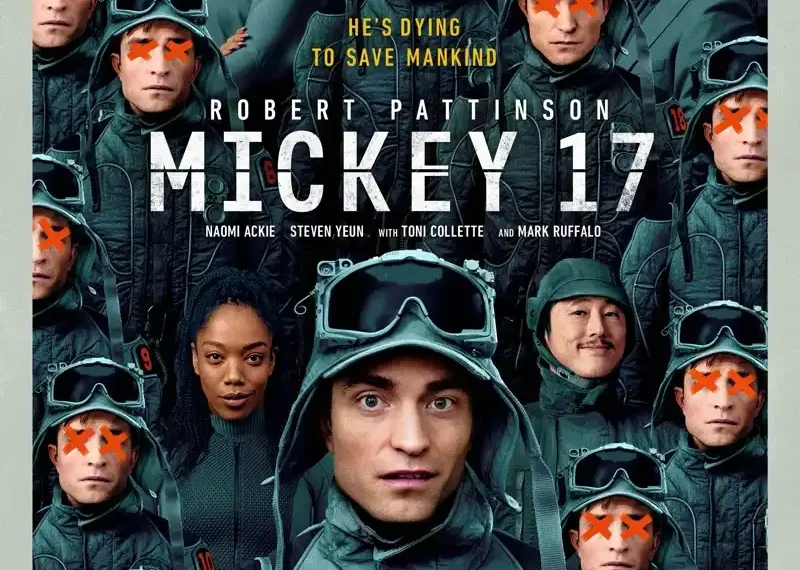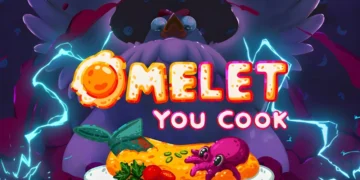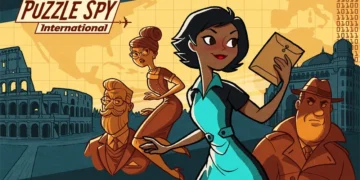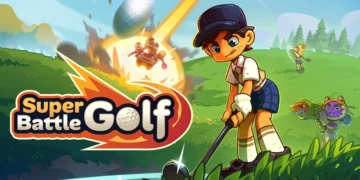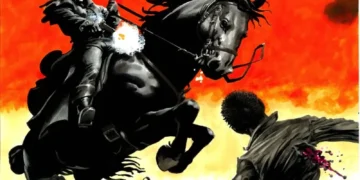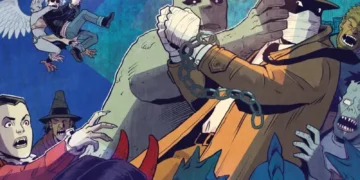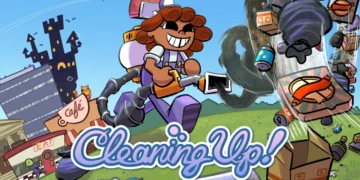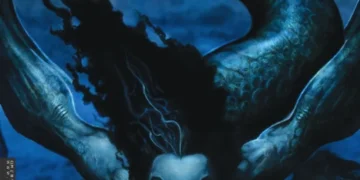Reviewed on February 15th at the 2025 Berlin International Film Festival – Berlinale Special. 137 Mins
Cast: Robert Pattinson, Naomi Ackie, Steven Yeun, Toni Collette, Mark Ruffalo
Genre: Dark Comedy, Sci-Fi, Adventure
Director: Bong Joon Ho
In Irish Cinemas: 7th March 2025
Bong Joon-ho’s long-awaited follow-up to Parasite arrives with eerie precision, capturing the mood of its time with both intent and a touch of serendipity. Initially slated for a March 2024 release but repeatedly delayed, Mickey 17 now lands as the first confirmed cinematic product of Trump Era 2.0. It’s a pitch-black, razor-sharp sci-fi satire that envisions a near-future where human life has been reduced to a disposable commodity, exploited by an aristocratic elite that cloaks its authoritarian ambitions in hollow religious rhetoric. In a particularly pointed nod to the political landscape of 2025, the devoted followers of this ruling class don signature red headwear emblazoned with ideological slogans—a not-so-subtle visual parallel to real-world movements.
Mickey Barnes (Robert Pattinson) is at the film’s heart, a debt-ridden everyman who volunteers to become an “Expendable” on a distant space colony. The job title is as grim as it sounds: he is assigned to high-risk, often fatal tasks, subjected to gruesome experiments with radiation and lethal viruses, only to be resurrected each time through a glitchy, jittering 3D bioprinter. Each death is agonising, and each rebirth comes with the entire memory of the suffering endured before. Pattinson plays multiple iterations of the endlessly replicable worker, a conceit that, while eventually taking a backseat to the larger narrative, provides the foundation for an absurdist, almost manic adaptation of Edward Ashton’s 2022 novel Mickey7.
Though the film discards much of the novel’s philosophical exploration of immortality and identity, it retains the core plot beats, including its caustic, darkly comedic opening. We meet Mickey as he plummets into an icy crevasse teeming with alien worm-like creatures on the frozen colony of Niflheim. His supposed best friend, the brash and pragmatic pilot Timo (Steven Yeun), doesn’t hesitate to abandon him—after all, another Mickey will be printed tomorrow. The film unpacks the journey leading up to this moment through rapid-fire flashbacks, with Bong’s kinetic montage style turning worldbuilding into a frenetic, near-overwhelming experience. Details flash by in a dizzying rush, none of them seemingly given much weight—an intentional choice that adds to the film’s bleak, nihilistic undertones. Yet, buried within this cynical framework, faint traces of humanity begin to flicker, though Bong makes the audience work for them, withholding emotional payoffs until deep into the runtime.
When Mickey 17 is presumed dead after his fall, the colony wastes no time printing his successor: Mickey 18. But against all odds, the original Mickey survives and returns to base, setting up the film’s central conflict. The simultaneous existence of two identical individuals is not just a logistical nightmare but a religious and philosophical abomination within this society. Forced into an uneasy alliance, Mickey’s 17 and 18 must navigate a world that cannot allow them both to exist, setting the stage for a tense, darkly comedic struggle for survival.
With its biting satire, relentless pacing, and willingness to embrace the absurdity of its premise, Mickey 17 emerges as a film uniquely suited to its moment—one that doesn’t just reflect the anxieties of its time but twists them into something both hilariously bleak and deeply unsettling.

While the threat of “permanent deletion” looms, solutions to their predicament arise startlingly. However, rather than offering relief, this only ensures that Mickey 17 takes its expected narrative turns early on before veering into unexpected territory. The most immediate danger to their survival isn’t the harsh environment of Niflheim but the colony’s authoritarian leader, Kenneth Marshall (Mark Ruffalo), a fanatical politician whose carefully crafted persona barely conceals his extremist ideology. Alongside his wife, Ylfa (Toni Collette), an elitist obsessed with culinary indulgence, Marshall presides over the settlement with grandiose promises of future greatness, maintaining control through a cocktail of coercion, hierarchy, and thinly veiled white supremacist rhetoric.
Marshall’s rule hinges on patriarchal, compulsory heterosexuality, framing genetic “purity” as an imperative for the colony’s success. His power plays extend beyond policy and into the intimate lives of his subjects—handpicking individuals for elaborate steak dinners (a stark contrast to their daily ration of protein slop) as a manipulative tool, making them feel chosen while reinforcing their duty to propagate the colony. His governing body is an unsettling fusion of corporate dominance and religious zealotry. This organisation mirrors how power is concentrated in the modern United States, where political and economic forces entwine to serve the few at the expense of the many.
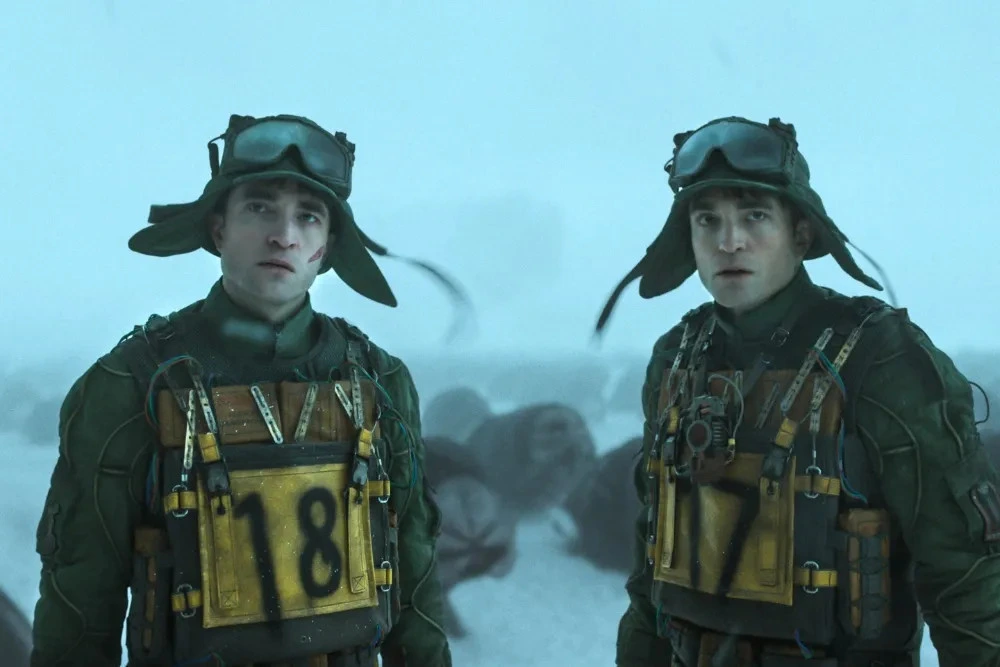
This critique is deeply embedded in Bong Joon-ho’s screenplay, most notably in the signature red hats worn by Marshall’s supporters—a deliberate allusion to Trumpism. Yet, the film’s political allegories extend beyond intentional symbolism. Some moments, like an assassination attempt that leaves a bullet grazing Marshall’s cheek, feel eerily prescient, unplanned echoes of real-world events. That Mickey 17 arrives in the wake of devastation wrought by the second Trump administration—amid a climate where space colonisation is championed by the wealthiest and most potent as both an escape plan and a vanity project—only sharpens its relevance.
The film’s villains are defined by an unsettling combination of arrogance, ignorance, and a capacity for staggering destruction, painting a dystopian vision in which resistance boils down to something as fundamental as enforcing basic checks and balances. That such a minimal act of defiance is framed as heroic speaks volumes. It is both a call to action and a sobering reflection of a political era in which American institutions feel like they are being gutted and auctioned off, leaving behind a country in disrepair.
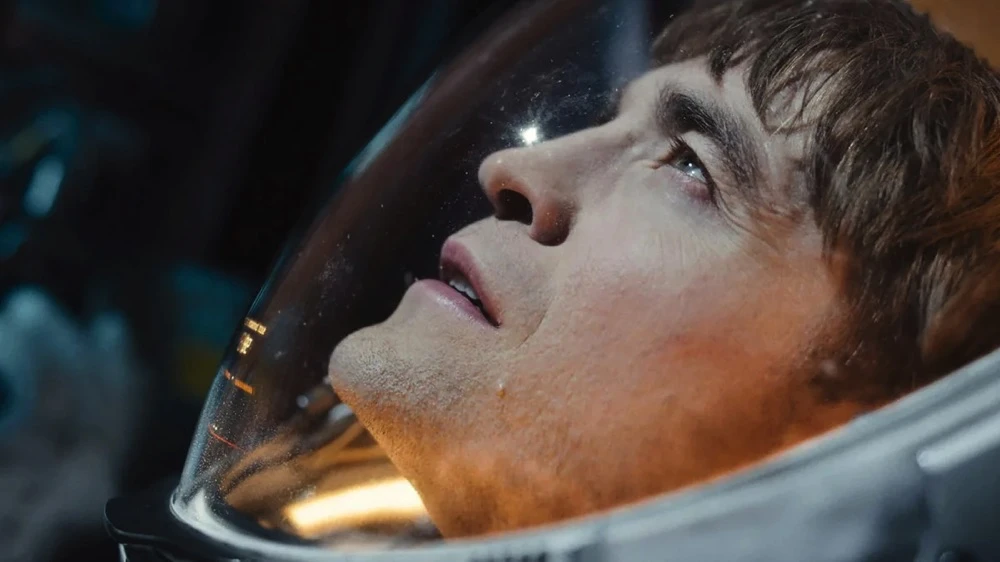
The film’s emphasis on symbolism occasionally comes at the expense of a deeper, character-driven narrative, which can sometimes be frustrating. However, the time spent with each cast member remains thoroughly engaging. Robert Pattinson’s portrayal of Mickey 17 is both peculiar and offbeat—his voice is nasal, his posture hunched, and his demeanor reminiscent of a hapless gremlin. He is the ultimate pushover, burdened by self-loathing and an almost comical lack of assertiveness. As a person, he’s not particularly admirable either. An early revelation about the planet’s indigenous inhabitants hinges on the audience recognising signs that Mickey stubbornly ignores, his overwhelming insecurity closing his eyes to any real sense of empathy.
Then there’s Mickey 18—who somehow manages to be even worse. The film explores how the personalities of these supposedly identical clones can vary drastically, leading to a darkly amusing power struggle between the two versions of Mickey. Unlike his predecessor, 18 is ruthless, manipulative, and far more adept at survival, easily outmaneuvering 17 in a battle of wits and will. This internal conflict raises a central question that looms over the entire story: Is there any hope for redemption for Mickey or humanity as a whole?
Even the supposed heroes of the film don’t inspire much confidence. Timo, played with an air of self-obsessed detachment, is deeply narcissistic. At the same time, Mickey’s girlfriend, Nasha (Naomi Ackie), is a loose cannon—unhinged, unpredictable, and delightfully feral in her role as a security officer. The more time we spend with these characters, the clearer it becomes that life under relentless economic oppression, where people are treated as disposable tools for productivity, has driven every single one of them to the brink of madness.
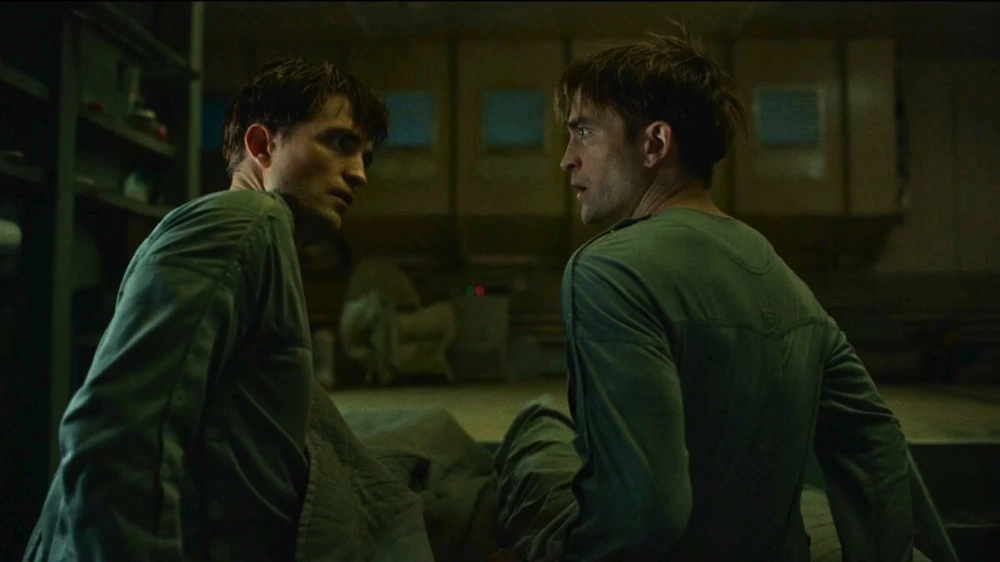
Bong Joon-ho’s Mickey 17 is a film where frenzied gesticulation, raucous arguments, and exaggerated physical comedy frequently take the place of traditional dramatic tension—sometimes to significant effect, sometimes to its detriment. The result is a uniquely disorienting blend of bleak humor, a chaotic energy that evokes the absurdity of contemporary political despair. Rather than offering hollow platitudes about resistance, Mickey 17 leans into its cynicism, turning Edward Ashton’s relatively straightforward novel into a biting commentary on the forces that have shaped our present reality. Yet, in doing so, it refuses to let anyone off the hook—especially those of us powerless against these larger systems but complicit in our ways. Suppose the survival of humanity is the central concern. In that case, losing one’s humanity—whether through coercion or willing surrender—becomes a dangerously thin line, as fine as the distinction between 17 and 18.
As Bong’s long-awaited follow-up to Parasite, Mickey 17 is a darkly comedic, nihilistic sci-fi adventure casts Robert Pattinson as a series of interchangeable, disposable worker drones. The film’s humor is as unsettling as its premise, amplified by an almost eerie political relevance. Bong’s adaptation transforms Ashton’s novel into something far more caustic, replacing traditional heroes with a Trumpian antagonist and a supporting cast whose moral failings only add to the film’s unsettling absurdity. While its character drama may feel unwieldy, Mickey 17 compensates with rich allegorical depth. It uses its outlandish premise to explore the terrifying ease with which humanity can be stripped away—both forcibly and voluntarily.
Overall: 7/10

